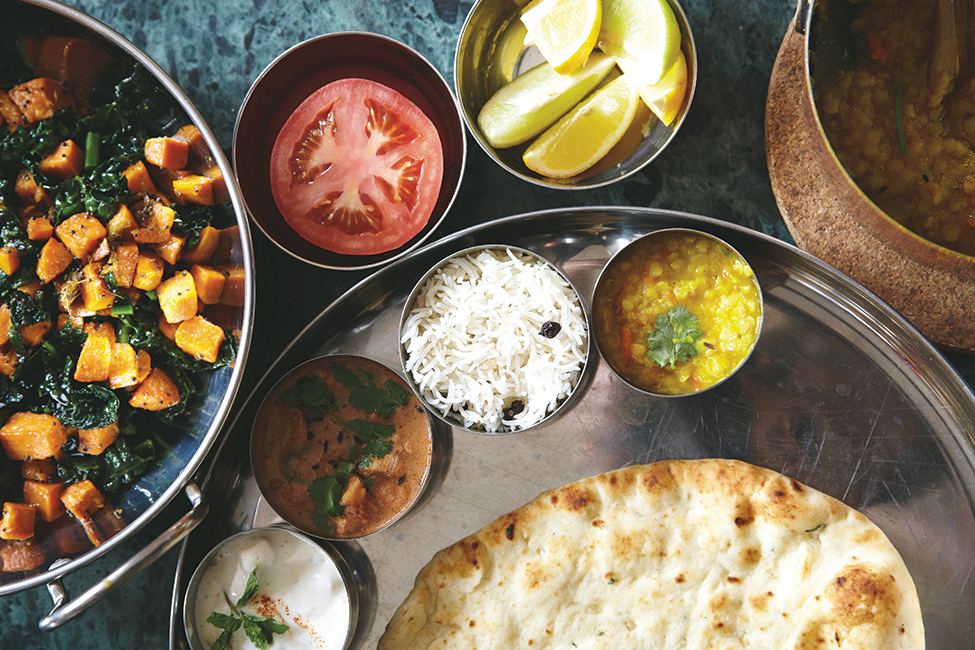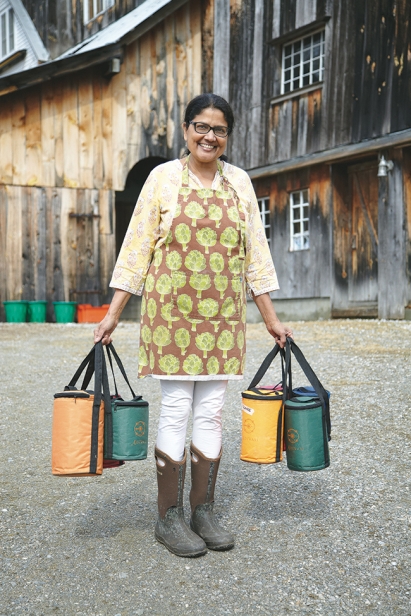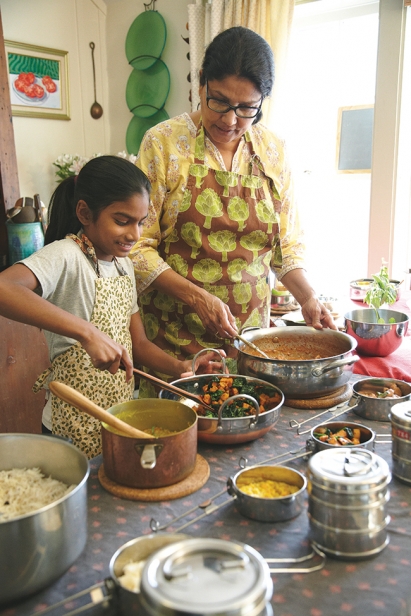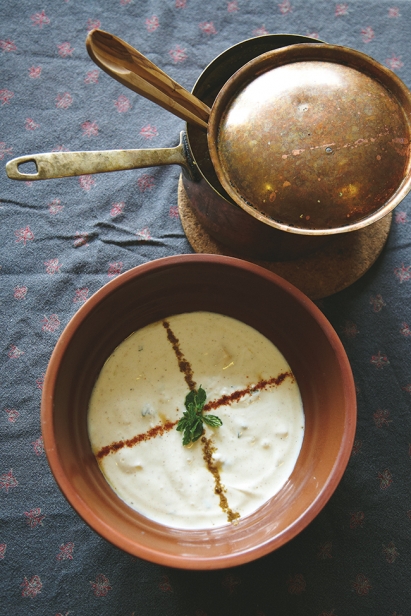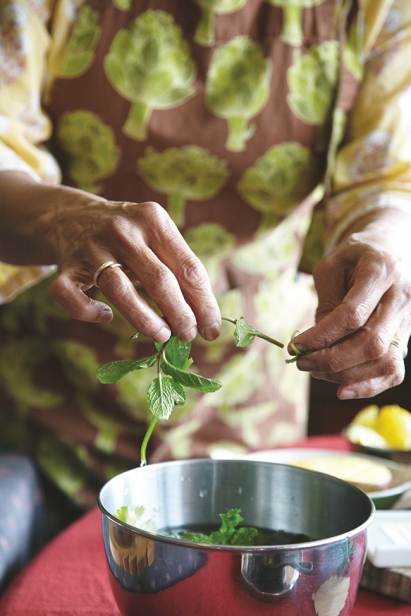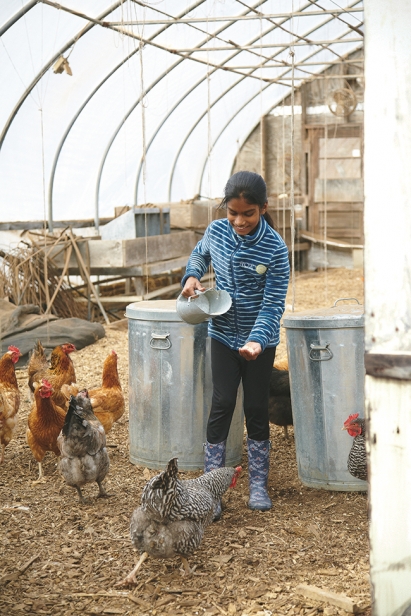Lini Mazumdar: Indian Home Cooking on a Vermont Farm
The true inspiration for Lini Mazumdar’s tiffin business came out of nowhere, as many great ideas do. She was shopping in Brattleboro at an Indian imports store when on the shelf she spotted 20 stainless-steel tiffins. Right then and there Mazumdar bought them all, brought them home and e-mailed friends and neighbors that she’d be cooking up a storm. A business was born.
A tiffin is a stack of interlocking containers, each holding a separate component of an Indian meal. In India, tiffin carriers are traditionally delivered to offices at lunchtime, but Mazumdar’s business is dinner based. The five basic categories of a tiffin meal are basmati rice, daal (the traditional Indian lentil stew), a vegetable dish, raita (a yogurt condiment) and a meat dish.
Customers also have the option of ordering a vegetarian tiffin by simply omitting the meat component of the tiffin stack. Meat is not central to an Indian meal for a number of reasons, says Mazumdar. “Many Indian people are vegetarian due to their religion, and there are so many excellent plant proteins available in Indian food, especially lentils and yogurt. Meat is more expensive and less easy to refrigerate, an issue in India where it is so hot.” Going meatless does not interfere with the Ayurvedic balance of the meal, which is fundamental to Mazumdar’s cooking.
Mazumdar describes her food as “home-style Indian with a Vermont twist.” She and her family—husband Emmett Dunbar and their daughter, Anisha—live on Anjali Farm in South Londonderry, where fresh, organic produce is readily available. Living on a farm makes healthful cooking easy, but Mazumdar backs it up with true knowledge; she is a certified Ayurvedic nutritionist and holistic counselor. Ayurvedic principles require whole, seasonal ingredients as well as specific food and spice combinations in order to ensure good health. If it isn’t sourced from her own farm, Mazumdar obtains her ingredients—with the exception of rice and pulses (dried beans, peas or lentils)—from other local farms and food purveyors. She strives to use organic meat and dairy products with no added antibiotics or hormones.
Tiffin day is Wednesday, and many customers order in multiples (one tiffin serves two eaters), sometimes up to five tiffins each! The way it works is that orders are placed via e-mail by Monday, and tiffins are picked up at the farm on Wednesday. The clean and empty containers are dropped back off at the farm. An interesting aspect of the business model is that customers never know exactly what Mazumdar is cooking up for dinner until they open the tiffins, meaning a delicious surprise comes hidden in their gleaming containers for dinner each week.
Indian food aficionado or not, Mazumdar’s unique dishes will pique your taste buds with their seasonal Vermont flavors. A descriptive menu accompanies each tiffin, telling about each specific dish and ingredient, as well as its origin. For dedicated Vermont locavores, this is required—as well as enjoyable—reading! Sample dishes include the following: red lentil daal with tomatoes, or green mung and yellow split pea daal with ginger and onions. Both are seasoned with turmeric, an essential spice in Indian cooking that imparts incredible documented health benefits in its effects against such diseases as Alzheimer’s, arthritis and certain types of cancer.
Next in the stack is raita, the traditional cooling yogurt dish that accompanies the sometimes spicy Indian fare. This can be anything from pineapple and onion raita, seasoned with cumin and black pepper, to a somewhat more traditional cucumber and mint raita with agave and five-seed powder. Examples of the vegetable course range from beet, carrot and pea stir-fry with roasted mustard seeds to sweet potato and turnip stir-fry with cumin and kalonji (an Asian spice also referred to as black cumin or nigella). Brown basmati rice is combined with millet, ghee, peas and cumin seeds or coconut, almonds and coconut oil for an unusual flair. The type of meat varies and can be anything from organic roasted chicken curry with tomato, onion and mango sauce to ground lamb with mint, potatoes and peas. Mazumdar’s goal is to inspire her customers with different tastes and flavors while providing healthy fare.
True to Vermont sensibilities, the menu is based on what is freshest and seasonally available, and also the cook’s fancy, a wonderful treat. Often Emmett will bring just-picked vegetables and herbs into the kitchen—chard, cilantro, kale and more—and help chop them as Mazumdar cooks. “It can be farm-to-tiffin in less than an hour,” he says. “It’s hard to get much fresher than that!”
Lini Mazumdar wears many business hats. In addition to cooking for her tiffin business, she does catering and runs both private and public cooking classes. She has also owned Lotus Moon Medicinals since 1998, growing organic medicinal herbs on Anjali Farm for her popular “farm-to-skin” products, primarily salves, oils and luscious face creams, including the wildly popular insect repellant “BUG OFF.” These products are sold throughout Vermont at food co-ops and farmers’ markets, local markets and via mail order.
But it is cooking for others that is truly Mazumdar’s passion: passing along her knowledge of food based on her Ayurvedic training and seeking to give her customers balance and improved health via the meals she prepares. She often chants as she cooks: “Om dhanvantre namaha,” invoking the god of health to bless the food so that those who eat it remain healthy.
And they thought it was just delicious.
Lini Mazumdar is based in South Londonderry, Vermont, and can be contacted via e-mail at linimazumdar@yahoo.com.
Michele Jacobson is a certified nutritionist, author and GMO-labeling advocate. Having indulged in Mazumdar’s food, her mouth was watering as she wrote this article.


